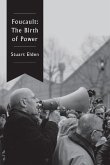Michel Foucault's The Archaeology of Knowledge was published in March 1969; Discipline and Punish in February 1975. Although only six years apart, the difference in tone is stark: the former is a methodological treatise, the latter a call to arms. What accounts for the radical shift in Foucault's approach?
Foucault's time in Tunisia had been a political awakening for him, and he returned to a France much changed by the turmoil of 1968. He taught at the experimental University of Vincennes and then moved to a prestigious position at the Collège de France. He quickly became involved in activist work concerning prisons and health issues such as abortion rights, and in his seminars he built research teams to conduct collaborative work, often around issues related to his lectures and activism.
Foucault: The Birth of Power makes use of a range of archival material, including newly available documents at the Bibliothèque nationale de France, to provide a detailed intellectual history of Foucault as writer, researcher, lecturer and activist. Through a careful reconstruction of Foucault's work and preoccupations, Elden shows that, while Discipline and Punish may be the major published output of this period, it rests on a much wider range of concerns and projects.
Hinweis: Dieser Artikel kann nur an eine deutsche Lieferadresse ausgeliefert werden.
Foucault's time in Tunisia had been a political awakening for him, and he returned to a France much changed by the turmoil of 1968. He taught at the experimental University of Vincennes and then moved to a prestigious position at the Collège de France. He quickly became involved in activist work concerning prisons and health issues such as abortion rights, and in his seminars he built research teams to conduct collaborative work, often around issues related to his lectures and activism.
Foucault: The Birth of Power makes use of a range of archival material, including newly available documents at the Bibliothèque nationale de France, to provide a detailed intellectual history of Foucault as writer, researcher, lecturer and activist. Through a careful reconstruction of Foucault's work and preoccupations, Elden shows that, while Discipline and Punish may be the major published output of this period, it rests on a much wider range of concerns and projects.
Hinweis: Dieser Artikel kann nur an eine deutsche Lieferadresse ausgeliefert werden.
"Foucault: The Birth of Power opens an illuminating window into the process of political awakening and philosophical transformation as intellectual history. Drawing on lectures, talks and unpublished as well as published material, Stuart Elden has marshalled the contents of a massive archive to substantiate this pivotal period in the development of one of the most influential thinkers of the twentieth century." - Caren Kaplan, University of California, Davis
"This is a brilliant prequel to Elden's masterful book, Foucault's Last Decade. Here, Elden offers a meticulous, erudite reading of the thinker's early years at the Collège de France - a critical time in the arc of his research, which included seminars and conferences on disciplinary power, with deep political engagement and activism on behalf of prisoners. With his unmatched knowledge of Foucault, Elden unearths key intellectual moments and carefully traces Foucault's intellectual journey to the mid-1970s, the publication of Discipline and Punish and the lectures on psychiatric power. Foucault: The Birth of Power is the perfect reading companion to Foucault's "power-knowledge" period." - Bernard Harcourt, Columbia University
"This is a brilliant prequel to Elden's masterful book, Foucault's Last Decade. Here, Elden offers a meticulous, erudite reading of the thinker's early years at the Collège de France - a critical time in the arc of his research, which included seminars and conferences on disciplinary power, with deep political engagement and activism on behalf of prisoners. With his unmatched knowledge of Foucault, Elden unearths key intellectual moments and carefully traces Foucault's intellectual journey to the mid-1970s, the publication of Discipline and Punish and the lectures on psychiatric power. Foucault: The Birth of Power is the perfect reading companion to Foucault's "power-knowledge" period." - Bernard Harcourt, Columbia University









